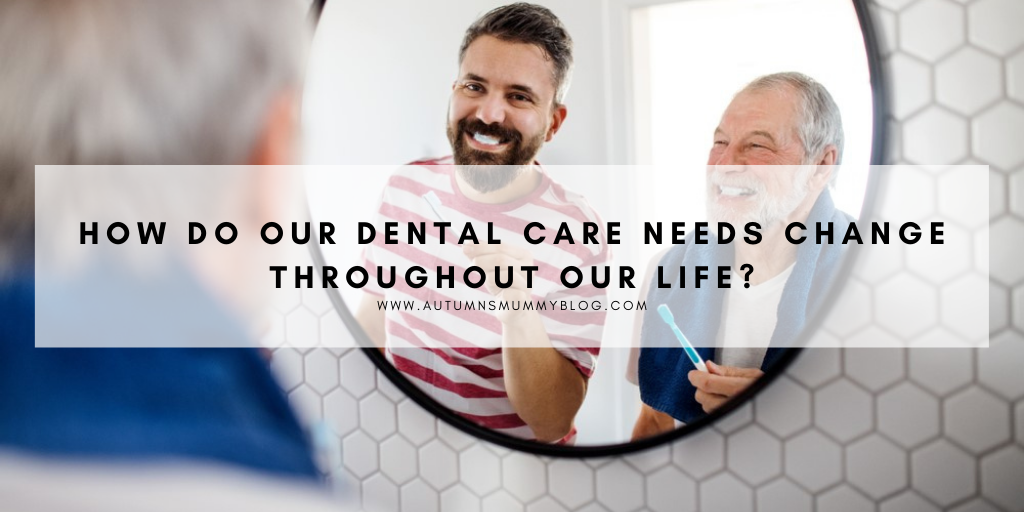Collaborative Post¦

Good dental care is an essential component of living a healthy and happy life, regardless of what age you are. Whether you’re caring for an infant or the elderly, good dental habits can go a long way in improving someone’s quality of life. As we transition through different phases of life, so do our dental care needs. Today, we look at how you can remain on top of your dental health throughout various stages in life, so read on to find out more!
Dental Health for Babies and Toddlers
As your baby starts teething around the 1 year mark, it is important that you do what you can to help soothe your child’s gums. Teething is often an uncomfortable and sometimes painful process due to baby teeth erupting through the gum. To reduce discomfort, dentists recommend giving your baby something cold to bite on and gently rubbing their gums with a clean finger. As soon as your baby’s first tooth appears, you can begin to clean their teeth using a soft infant toothbrush designed for children under the age of 2.
As your child transitions from baby to toddler, brushing twice a day should become mandatory. On top of a healthy brushing schedule, it is also recommended that parents encourage daily flossing in order to keep young gums healthy. Avoid giving your child foods high in sugar as they can cause serious tooth decay in children and be sure to visit dentist York or a dentist nearer to you regularly for routine checks and cleans. Yes, even babies need to see the dentist!
Kids and Teenagers
Kids can start losing their baby teeth as early as the age of 4 all the way up till they are 12 or 13, and as adult teeth come in it is vital that children are taught good dental habits that will enable them to keep their oral health in check for life. Brushing twice a day, flossing and maintaining a healthy diet is key, along with routine checkups at the dentist for scaling and cleaning.
Once your child or teenager’s full set of adult teeth come out, you may consider Wondersmile clear aligners or braces if your child suffers from crooked teeth, bite problems or overcrowding. The earlier you get this done the better, as orthodontic treatment often takes much longer to work when implemented on adults.
Young Adults and Adults Under 40
With age, it becomes even more important to take extra care of your teeth and oral health needs. Many believe that it is simply normal to lose teeth in older age, but that is not so. By taking good care of your teeth in early adulthood, you will be able to set yourself up for teeth that last a lifetime. Neglected teeth and gums may result in tooth decay, tooth loss, and infections. If a cavity becomes too deep to manage, your dentist may recommend root canal treatment or tooth extraction. If the latter happens, you may need dental implants Swindon. In order to prevent this, keeping up with regular brushing, flossing and dental check ups is key.
Dental Health During Pregnancy
With so many things that soon to be parents have to juggle, scheduling a dental check up may be low on the priority list. However, it is incredibly important to keep up with your regular dental check-ups during pregnancy as you may be more vulnerable to tooth loss during this period. If you are experiencing morning sickness, constant vomiting exposes your tooth enamel to acid and may cause tooth erosion. Additionally, elevated levels of estrogen and progesterone can loosen the tissue and bones that keep your teeth in place, leading to tooth loss at an all too early age.
It is important to let your Dentist in Glendale, Arizona or your local dentist know if you are pregnant so that they can advise you on the best dental practices to adopt. Eating a balanced diet, regular brushing and flossing are all incredibly effective ways to take care of your oral health during pregnancy, but do remember to avoid brushing straight after vomiting. Instead, rinse your mouth out with water and wait a minimum of one hour before attempting to brush your teeth.
Senior Dental Care
Good oral health is a (lifelong) lifestyle, and you should continue to prioritise your dental health even in your senior years in order to prevent a multitude of health problems. At this stage of life, you should make it a priority to schedule regular dental check ups even if you wear denchers. This will help your dentist look out for potential problems sooner rather than later. Seniors are prone to cavities, periodontal disease, and dry mouth as a side effect of many medications, so keeping on top of your dental health is of utmost importance.
At this stage of life, it also becomes important to look out for early signs of oral cancer. Consult your dentist and doctor immediately if you find sores or reddish/white patches inside your mouth (tongue, cheeks, tonsils, gums). Around 59% of oral cancers in Australia are caused by smoking, and 31% caused by excess alcohol consumption. Avoiding these vices early on in life is the best way to reduce your chances of developing cancer.
At the end of the day, as long as you stick to good oral hygiene practices and visit the dentist regularly, you should be able to avoid many serious dental problems. We hope that this article has been helpful in giving you some valuable information on how you can stay on top of your dental health, regardless of which stage of life you are in.
Disclosure: This is a collaborative post.
